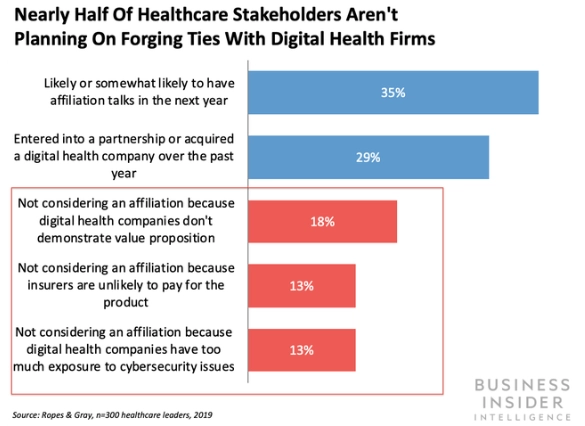

Digital healthcare digest — October 2019
- Things to note about the market for digital health startups
- Tech giants in digital health: Facebook, Amazon, Apple, Google
- Digital health startups that got FDA approval in October
- Digital health startups: Funding scores
- New eHealth and mHealth products and services
- October success story: digital tech benefits for healthcare
- Research on and through health tech
October was a month of giant announcements and deals, so let’s dive into them!
Things to note about the market for digital health startups
New Rock Health report says funding in digital healthcare moderated in Q3. Among other things, huge deals continue to happen, one more company is to go public (Progyny announced the valuation of more than $1.3 billion), and the market is especially warm for women’s health and behavioural health startups.
Stakeholders in healthcare are still very hesitant about adopting digital health solutions. The main reasons are: digital health doesn’t understand the healthcare market, products aren’t proved (clinically) to be useful, cybersecurity isn’t as good as stakeholders would want.

Some healthcare stakeholders said to NHSX AI report they think digital transformation and tech adoption is more about politics than healthcare outcomes.
We wrote an article that will help you to understand specifics and challenges American and European healthcare systems have.
Tech giants in digital health: Facebook, Amazon, Apple, Google
Apple filled pattern for a fabric-based piece of closing that can wirelessly connect to external electronics. They could be planning a release of smart clothing.
Amazon made Textract, their machine learning tools for processing scans, HIPAA eligible (and compliance, as it seems, is coming). Amazon also made the second Healthcare acquisition: it will be startup Health Navigator, which provides tech and services for digital health. Health Navigator would be integrated into their Primary Care tool for Seattle employees.
Facebook released a new tool, Preventive Health, that will remind users about regular checkups like flu shots or mammogram, show them nearest physicians and allow them to schedule appointments.
Google acquires Fitbit. Now, officially.
Deals and partnerships in digital healthcare
Livongo made a deal with telemedicine companies MD Live and Doctor on Demand. After integration, Livongo users will get access to telemedicine services through the platform.
Uber and Cerner partnered up: doctors who use Cerner EHR will be able to call Uber Health for their patients’ appointments.
Digital health startups that got FDA approval in October
Dexcom G6 Pro Continuous Glucose Monitoring System got FDA approval. It can gather real-time data on blood glucose level for ten days and send it to people’s physicians.
FDA cleared Aboott’s Proclaim XR — a system for neurostimulation that relieves pain by interrupting pain signals on their way from the spinal cord to the brain. Now, Aboott has submitted the implant for CE mark to expand on Europe.
Digital health startups: Funding scores
AI-based Chatbot that helps users dive into the specifics of insurance benefits and plan health actions, Sensely, raised 15M in Venture Round.
French FeetMe wearable sensor device for tracking gait and posture scored €9.4 in Series A.
Viz.ai, an AI company for triaging stroke patients and care coordination, landed $50M in Series B.
Diligent Robotics collected $3M in seed funding and launched Moxi, a robot-helper for hospitals.
Mednition, a startup that got machine learning algorithms to help nurses in ER make decisions faster, raised $10M in Series A.
Lively, developers of modern health saving accounts, secured $27M in Series B. Through their services, users have already saved more than $1 in HSA fees.
New eHealth and mHealth products and services
Butterfly Network, creators of ultrasound devices, connected to smartphones, launched the Butterfly Enterprise platform that is device-agnostic, that connect third-party ultrasound devices and providers’ EHRs or PACS’.
Project-scheme that allows ambulance workers to view summaries of patients’ medical records passed training stage and was launched for London Ambulance Service.
NHS launched a platform that is aimed at helping people experiencing issues with mental health through personalized getting well plans.
Tobii Dynavox, a company that develops assistive tech for communication, launched the next generation of I-Series with eye-tracking sensor!
Hampshire Hospitals NHS Foundation Trust integrated a new process for interactions between community pharmacists and patients, recently discharged with their meds. Through Transfer of Care Around Medicines (TSAM), pharmacists will advise people on how to take their meds correctly to avoid readmissions.
Newcastle Hospitals NHS Foundation Trust opened a new 3D facility, built by axial3D, medial 3D printing firm. It will give clinicians hands-on access to patient-specific 3D models through automated software.
October success story: digital tech benefits for healthcare
Practitioner Dr. Angela Willis used PatientPop — services and technology, aimed at medical practice growth, online rep, scheduling, and prof audits. During the last year, Willis gained 807 new patients and 81 patients review. About 11% of her website visitors scheduled appointment every month.
Using Holon Solution’s software for automated referral authorization, integrated into the EHR, Florida-based Primary Care Offices cut the authorization process from 5 minutes to 25 seconds.
AI-based nursing service from Health Navigator (yeah, latest Amazon acquisition) that helps to identify patients at risk of unplanned care visits and admission and give them instructions to improve their conditions reduced unplanned admissions across seven NHS acute sites by 59%. Imagine the savings!
McLaren Health Care, a health system in Michigan, partnered with Healthcare Forward, a physician-led business that helps providers to develop and implement an infrastructure value-based care, and hc1, a vendor that develops software that helps give the right prescription to the right patients. They developed the test and blood utilization programs across McLaren, reducing tests per patient per day by 5.6% within 15 months, saving $383,000.
Research on and through health tech
The study by John Hopkins deemed wearables effective and reliable to read up on users’ health state and their mortality risks.
The study showed that unstructured EHR data is more useful for predictive analytics, than structured.
Study on Proteus efficiency suggested their pill and sensor systems could be as efficient as directly-observed adherence programs: system efficiently determine whether or not patients medicated.
Telemedicine is proved to be a convenient channel for delivering contraception.
NPJ Digital Health asked thousands of participants with long-term pain to report their daily pains, along with their GPS location, their daily pains. That allowed researchers to discover a “significant, yet modest” correlation between daily pain and weather, such as high humidity.
Studies and surveys about the health tech market
U.S. Healthcare Consumer Experience Study shows: a third of patients don’t like their providers’ digital billing process that often results in uncollected hospital bills, and 41% of respondent told Cedar, who ran the survey, that they would drop provider after a bad experience with online bill pay, digital pre-appointment forms, or mobile and email bills delivery.
LIVI’s survey shows that inefficient legacy tech is tiring for doctors, and it hampers telemedicine practice. One of the main complaints are old hardware, poor connection to wi-fi.
Consumer-facing digital health apps continue to be bad. Researchers analyzed them, and figured they have incorrect or untruthful content, poor functionality and design, and even can harm users following their recs.
What to read in October 2019?
What Amazon can do with healthcare data by Natasha Lomas on TechCrunch.
Patient AI report by RSA on how technologies are “influencing commissioning and clinical practice in health system.” Very useful if you want to understand hesitancy and, in general, the attitude towards innovations in healthcare providers.
How baby boomers gaud tech to update hearing devices.
What can quantum computing do to healthcare by The Medical Futurist.
What to listen and watch on digital healthcare?
Interview with Rajiv Kumar, CMO and President of Virgin Pulse Institute, on future of enterprise healthcare: retaining users, employees’ health outcomes, acquisition of Simply Well, etc.
Retrospect on (or find out) what happened in the healthcare industry in September, August, July.
If you want to see your business (or article on tech in healthcare) in our monthly digest, contact us. And, subscribe to our blog to receive this series in your inbox.
Tell us about your project
Fill out the form or contact us

Tell us about your project
Thank you
Your submission is received and we will contact you soon
Follow us

